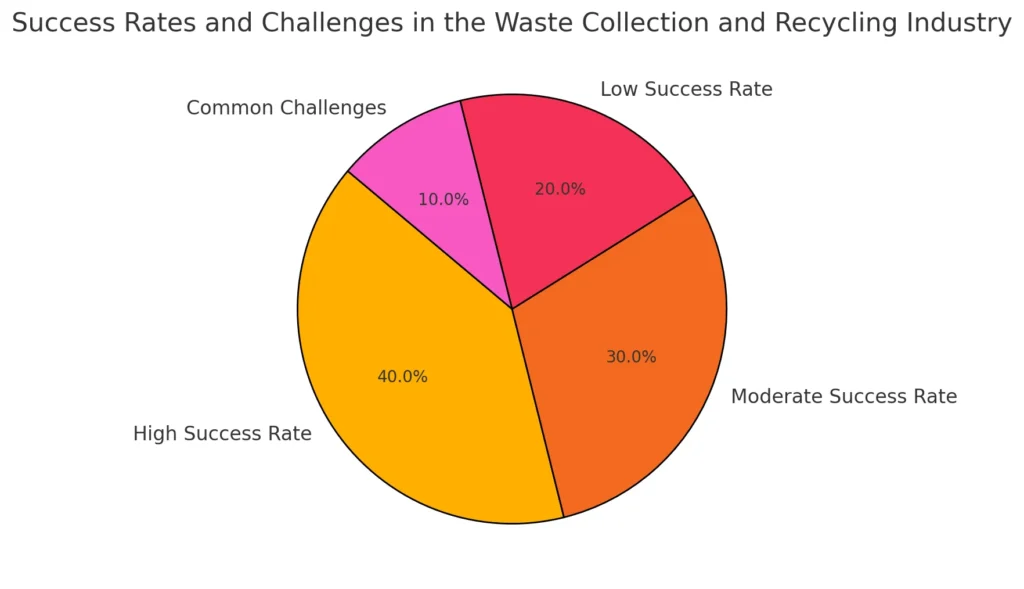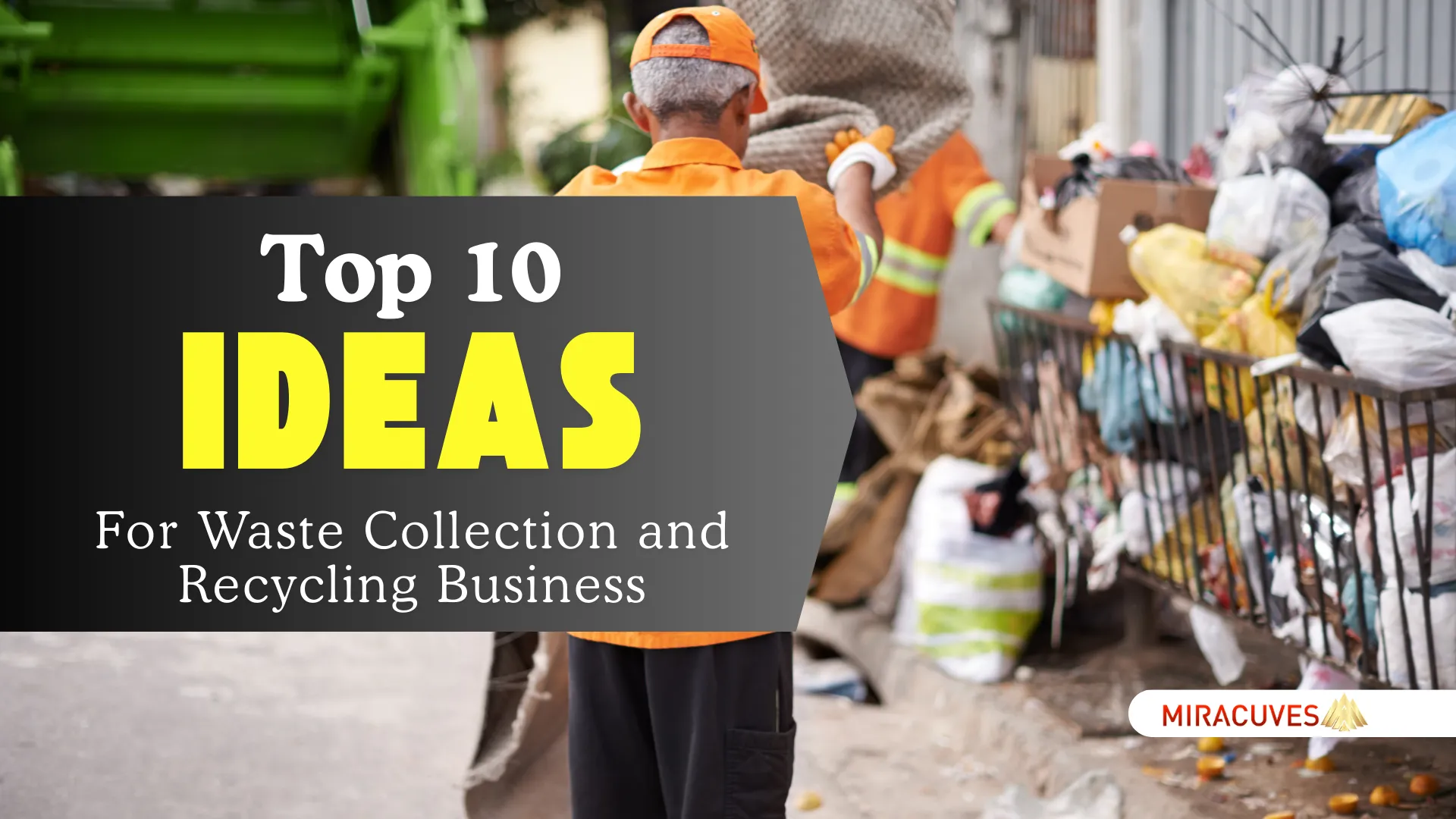As global awareness of environmental sustainability grows, the waste collection and recycling industry has become a vital space for impactful business startups. With rising demand for waste management solutions and eco-friendly practices, this industry offers substantial opportunities for entrepreneurs ready to innovate and make a difference. Whether dealing with household waste, industrial recycling, or tech-driven collection systems, there is a significant market waiting to be tapped. As more communities and businesses look for ways to manage waste responsibly, starting a waste collection and recycling business could be the first step toward creating a cleaner, greener future.
| Metric | Data |
|---|---|
| Global Market Size (2024) | $530 billion |
| Expected Growth Rate (2024-2030) | 5.3% CAGR |
| Major Growth Drivers | Increased awareness of sustainability, stricter environmental regulations, rising waste production |
| Key Trends | Smart waste management, recycling innovations, circular economy practices |
| Leading Segments | Plastic recycling, e-waste management, organic waste recycling |
Why Choose the Waste Collection and Recycling Industry?
The waste collection and recycling industry isn’t just a business opportunity; it’s a path toward making a lasting environmental impact. Today’s world generates unprecedented levels of waste, and as communities and organizations focus on sustainability, there’s a critical need for efficient, innovative waste management solutions. By starting a business in this industry, entrepreneurs can meet this rising demand while contributing to cleaner cities and a healthier planet.
The appeal of the waste and recycling industry lies in its resilience and growth potential. As countries worldwide enforce stricter environmental regulations, the demand for reliable waste collection services and innovative recycling processes continues to grow. This sector is becoming increasingly attractive due to its diverse entry points, from e-waste recycling to organic waste collection, making it easier for startups to find a niche that aligns with their expertise and resources.
Must read: Top 10 Ideas for Snow Removal Business Startups in 2025
Current Trends and Future Opportunities in Waste Collection and Recycling
| Trend/Technology | Description | Impact |
|---|---|---|
| IoT Waste Management | Sensors and IoT devices for tracking waste levels and optimizing collection schedules | Increases efficiency, reduces costs |
| AI Sorting Systems | Artificial intelligence used to sort recyclable materials with high precision | Improves recycling accuracy, reduces contamination |
| Circular Economy Models | Systems designed for continuous reuse, repurposing, and recycling of materials | Reduces waste, creates new revenue streams |
| Organic Waste Composting | Turning organic waste into compost for agricultural or landscaping use | Lowers landfill waste, promotes sustainability |
| E-Waste Recycling | Specialized processes for recycling electronic waste to recover valuable materials | Reduces toxic waste, recovers precious metals |
The waste collection and recycling industry is rapidly evolving, driven by technology and changing consumer expectations for environmental responsibility. Smart waste management systems, like IoT-enabled sensors and AI sorting technologies, are revolutionizing how waste is collected, sorted, and processed, making operations faster, more accurate, and cost-efficient. These advancements allow businesses to streamline logistics, reduce contamination in recycling streams, and maximize recovery rates, setting new standards in efficiency.
Future opportunities in this industry are equally exciting, with many companies exploring circular economy practices. The concept of a circular economy aims to minimize waste by designing products and systems that allow materials to be reused, repurposed, or recycled continuously. This approach not only conserves resources but also opens up new revenue streams in sectors like plastic and e-waste recycling, organic waste composting, and textile upcycling.
Sustainability-focused consumers are also reshaping the market. As demand grows for eco-friendly services, waste collection startups can attract a loyal customer base by adopting green practices and emphasizing social responsibility in their business models.
Top 10 Ideas for Waste Collection and Recycling Business Startups
Starting a business in waste collection and recycling offers a unique opportunity to blend profitability with environmental responsibility. Here are ten high-potential business ideas to consider, each addressing a key area within the industry and offering distinct advantages:
| Business Idea | Startup Costs | Target Market | Potential Profit |
|---|---|---|---|
| Residential Waste Collection Services | Moderate | Households, residential communities | Steady, long-term income |
| Electronic Waste (E-Waste) Recycling | High | Households, businesses, manufacturers | High, with potential for growth |
| Plastic Recycling Plant | High | Manufacturers, eco-conscious brands | High, due to rising demand |
| Composting Business | Low to Moderate | Households, restaurants, agriculture | Moderate, with local demand |
| Glass Recycling Facility | Moderate | Construction companies, manufacturers | Moderate to high |
| Paper and Cardboard Recycling Business | Moderate to High | Paper manufacturers, offices | Moderate, steady market |
| Textile and Fabric Recycling | Moderate | Fashion brands, textile industries | Moderate, growing market |
| Metal Recycling and Scrap Yard | High | Automotive industry, construction | High, with valuable metals |
| Construction and Demolition Waste Recycling | High | Construction firms, local governments | High, due to sustainability focus |
| Battery Recycling Services | Moderate to High | Households, electronics, automotive | High, driven by eco-regulations |
1. Residential Waste Collection Services
- Why: Essential for urban and rural areas alike, with steady demand.
- Startup Requirements: Fleet of collection trucks, licensing, and waste disposal partnerships.
- Target Market: Households, residential communities.
- Estimated Costs: Moderate startup costs for vehicle acquisition and maintenance.
2. Electronic Waste (E-Waste) Recycling
- Why: Growing need due to rapid tech turnover and regulatory requirements for safe disposal.
- Startup Requirements: Specialized equipment, partnerships with electronics retailers, knowledge of hazardous waste handling.
- Target Market: Households, businesses, electronics manufacturers.
- Estimated Costs: Higher initial investment for equipment.
3. Plastic Recycling Plant
- Why: Increased demand for recycled plastic products amid global plastic waste issues.
- Startup Requirements: Machinery for sorting, shredding, and melting plastics, partnerships for raw plastic sourcing.
- Target Market: Manufacturers, eco-conscious brands.
- Estimated Costs: High investment for equipment and facility setup.
4. Composting Business
- Why: Rising interest in organic waste composting for sustainable agriculture and landscaping.
- Startup Requirements: Composting bins, land for compost piles, knowledge of organic material processing.
- Target Market: Households, restaurants, agricultural businesses.
- Estimated Costs: Low to moderate.
5. Glass Recycling Facility
- Why: Growing demand for recycled glass in construction, packaging, and art.
- Startup Requirements: Crushing and melting machinery, sourcing of used glass.
- Target Market: Construction companies, glass manufacturers.
- Estimated Costs: Moderate.
6. Paper and Cardboard Recycling Business
- Why: Ongoing demand for recycled paper products, from packaging to office supplies.
- Startup Requirements: Sorting and pulping equipment, partnerships with paper and packaging companies.
- Target Market: Paper manufacturers, offices, packaging suppliers.
- Estimated Costs: Moderate to high.
7. Textile and Fabric Recycling
- Why: Addressing the rising environmental impact of the fashion industry.
- Startup Requirements: Sorting facility, relationships with textile manufacturers.
- Target Market: Fashion brands, textile industries, eco-conscious consumers.
- Estimated Costs: Moderate.
8. Metal Recycling and Scrap Yard
- Why: Essential for recycling valuable metals and supporting various industries.
- Startup Requirements: Scrap collection facilities, partnerships with metal-processing plants.
- Target Market: Automotive industry, construction companies.
- Estimated Costs: High.
9. Construction and Demolition Waste Recycling
- Why: Increased construction activity and need to manage debris sustainably.
- Startup Requirements: Heavy machinery for crushing and sorting, disposal partnerships.
- Target Market: Construction firms, local governments.
- Estimated Costs: High.
10. Battery Recycling Services
- Why: Rising awareness of battery toxicity and demand for sustainable disposal.
- Startup Requirements: Specialized recycling facilities, partnerships with retailers and manufacturers.
- Target Market: Households, electronics companies, automotive sector.
- Estimated Costs: Moderate to high.
Real-World Examples
Starting a waste collection or recycling business may seem challenging, but countless success stories show the positive impact and profitability of this industry. Entrepreneurs around the globe are building successful, eco-friendly businesses while contributing to a cleaner environment. For example, small-scale composting businesses are booming in urban areas, where they convert organic waste from restaurants and households into valuable compost for urban farms and gardening communities. These ventures have proven to be sustainable and profitable, serving both the business owner and the community’s green needs.

Another inspiring example is the rise of e-waste recycling startups that collect discarded electronics and safely extract valuable metals like gold, silver, and copper. With the growing awareness of electronic waste hazards, these businesses are increasingly popular, tackling both the need for safe disposal and the opportunity to recycle precious resources.
Startups specializing in plastic recycling are also seeing substantial growth, especially as consumer demand for sustainable products surges. These businesses collaborate with manufacturers to repurpose plastic waste into products like packaging, clothing, and construction materials, showing how a single recycled material can drive multiple business opportunities.
Also Read : How AI and ML Are Powering Next-Gen E-commerce Apps for Maximum Growth
Mistakes to Avoid When Starting a Waste Collection and Recycling Business
| Common Mistake | Description | Preventive Measure |
|---|---|---|
| Ignoring Regulatory Requirements | Overlooking local and environmental regulations, risking fines and legal issues. | Conduct thorough research on all relevant regulations. |
| Neglecting Efficient Waste Sorting | Inadequate sorting leads to contaminated materials, reducing the quality of recycled products. | Invest in sorting methods and train staff effectively. |
| Overlooking Community Outreach | Lack of community engagement can result in lower customer loyalty and awareness. | Build strong local connections and educate customers. |
| Insufficient Financial Planning | Underestimating startup costs and operational expenses can lead to cash flow issues. | Develop a detailed budget covering all operational needs. |
| Not Prioritizing Staff Training | Untrained staff can lead to inefficiencies and safety issues in waste handling. | Implement regular training programs for safety and accuracy. |
Launching a waste collection or recycling business comes with unique challenges, and avoiding common pitfalls can significantly increase the likelihood of success. One of the most frequent mistakes is underestimating regulatory requirements. Waste management businesses must often comply with strict environmental and safety regulations, which can vary widely depending on location. Skipping this step can lead to fines or even business shutdowns, so it’s essential to thoroughly research and adhere to all regulations from the outset.
Another common misstep is neglecting efficient waste sorting practices. Efficient sorting is crucial in recycling to ensure materials are clean and ready for processing. Investing in effective sorting methods and training staff can prevent contamination, which could otherwise decrease the quality and value of recycled materials.
Additionally, many startups overlook the importance of community outreach and education. Building strong connections with the local community can foster trust and increase customer loyalty. Educating customers on how to separate and prepare their waste correctly can also help streamline operations and reduce sorting costs.
Finally, budgeting effectively is crucial. The waste collection and recycling business often require upfront investment in equipment and facilities, so careful financial planning is necessary to maintain operations and scale over time. Avoiding these common mistakes can help new businesses establish themselves in the industry and achieve long-term success.
Why Trust Miracuves Solutions for Your Next Project?
When it comes to building a successful waste collection or recycling business, having the right technological partner can make all the difference. Miracuves Solutions offers a unique blend of experience, innovation, and a deep commitment to client success, making it the perfect choice for entrepreneurs ready to break into this industry. With proven expertise in on-demand app development and tech solutions tailored for waste management, Miracuves Solutions provides everything needed to streamline operations, manage logistics, and enhance customer interactions.
Miracuves Solutions understands the complexities of the waste collection and recycling field, from regulatory requirements to operational efficiency. By focusing on user-friendly, customized platforms, we help businesses optimize routes, manage real-time data, and track waste collection processes, all while maintaining a strong emphasis on sustainability. Our clients benefit from increased efficiency, reduced costs, and improved service quality—all key components in building a successful and impactful waste management business.
Choose Miracuves Solutions as your partner in transforming waste management ideas into a profitable and sustainable reality. With a clear track record of success and dedication to client goals, Miracuves Solutions is here to support every step of your journey in this dynamic and essential industry.
Conclusion
The waste collection and recycling industry presents a unique blend of profitability and purpose, allowing businesses to thrive while contributing to a cleaner, greener planet. With a variety of business ideas available—each catering to specific needs in waste management and recycling—there’s ample opportunity for entrepreneurs to make their mark. From tackling e-waste and plastics to transforming organic materials into valuable compost, every effort made in this industry has a positive ripple effect on the environment and the community.
Now is the perfect time to dive into the waste collection and recycling sector, armed with the knowledge and strategies necessary for success. With thoughtful planning, an eye on current trends, and a commitment to sustainable practices, you can create a business that stands out and makes a real difference.
FAQs
What are the most profitable waste collection and recycling business ideas?
Some of the most profitable ideas include e-waste recycling, plastic recycling plants, and metal scrap yards due to high demand and valuable materials recovered.
How much does it cost to start a waste management business?
Startup costs vary widely but typically range from moderate to high depending on the type of waste handled and the equipment required.
Is waste collection a sustainable business model?
Yes, waste collection and recycling are sustainable and essential for environmental conservation, especially as regulations and consumer awareness grow.
Do I need specialized equipment to start a recycling business?
Yes, most recycling businesses require specific equipment to handle, sort, and process different types of waste, which ensures efficiency and safety.
What are the main challenges in the waste collection industry?
Key challenges include regulatory compliance, proper waste sorting, and maintaining consistent customer engagement.







